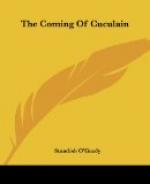O’Grady in his stories of the Red Branch rescued from the past what was contemporary to the best in us to-day, and he was equal in his gifts as a writer to the greatest of his bardic predecessors in Ireland. His sentences are charged with a heroic energy, and, when he is telling a great tale, their rise and fall are like the flashing and falling of the bright sword of some great champion in battle, or the onset and withdrawal of Atlantic surges. He can at need be beautifully tender and quiet. Who that has read his tale of the young Finn and the Seven Ancients will forget the weeping of Finn over the kindness of the famine-stricken old men, and their wonder at his weeping and the self-forgetful pathos of their meditation unconscious that it was their own sacrifice called forth the tears of Finn. “Youth,” they said, “has many sorrows that cold age cannot comprehend.”
There are critics repelled by the abounding energy in O’Grady’s sentences. It is easy to point to faults due to excess and abundance, but how rare in literature is that heroic energy and power. There is something arcane and elemental in it, a quality that the most careful stylist cannot attain, however he uses the file, however subtle he is. O’Grady has noticed this power in the ancient bards and we find it in his own writing. It ran all through the Bardic History, the Critical and Philosophical History, and through the political books, “The Tory Democracy” and “All Ireland.” There is this imaginative energy in the tale of Cuculain, in all its episodes, the slaying of the hound, the capture of the Laity Macha, the hunting of the enchanted deer, the capture of the wild swans, the fight at the ford and the awakening of the Red Branch. In the later tale of Red Hugh which he calls “The




